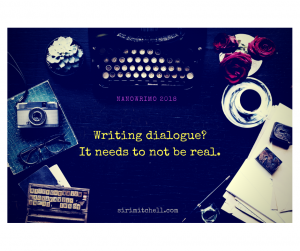
Dialogue is the most fake-y thing that novelists write. Everything else needs to be true to reality to provoke reader emotion (which is the goal of the novelist). But dialogue? It needs to not be real. Think about this the next time you’re listening to a conversation: it’s stuffed with ‘um’s, ‘uh’s, ‘like’s, ‘ you know’s, and other fillers. It’s punctuated with ‘well’s and ‘actually’s and ‘honestly’s. It’s bookended by exchanges that don’t mean anything: ‘How are you?’ ‘I’m fine.’ ‘How are you?’
It’s amazing that anything ever gets understood at all!
So when you write dialogue leave out the transcription. Concentrate on exchanges that create conflict, whether vocalized or not. Remember, some of the most under-utilized tools for character development are not what characters say to others but the things they don’t say, the things they say to themselves, and the things other characters say about them.